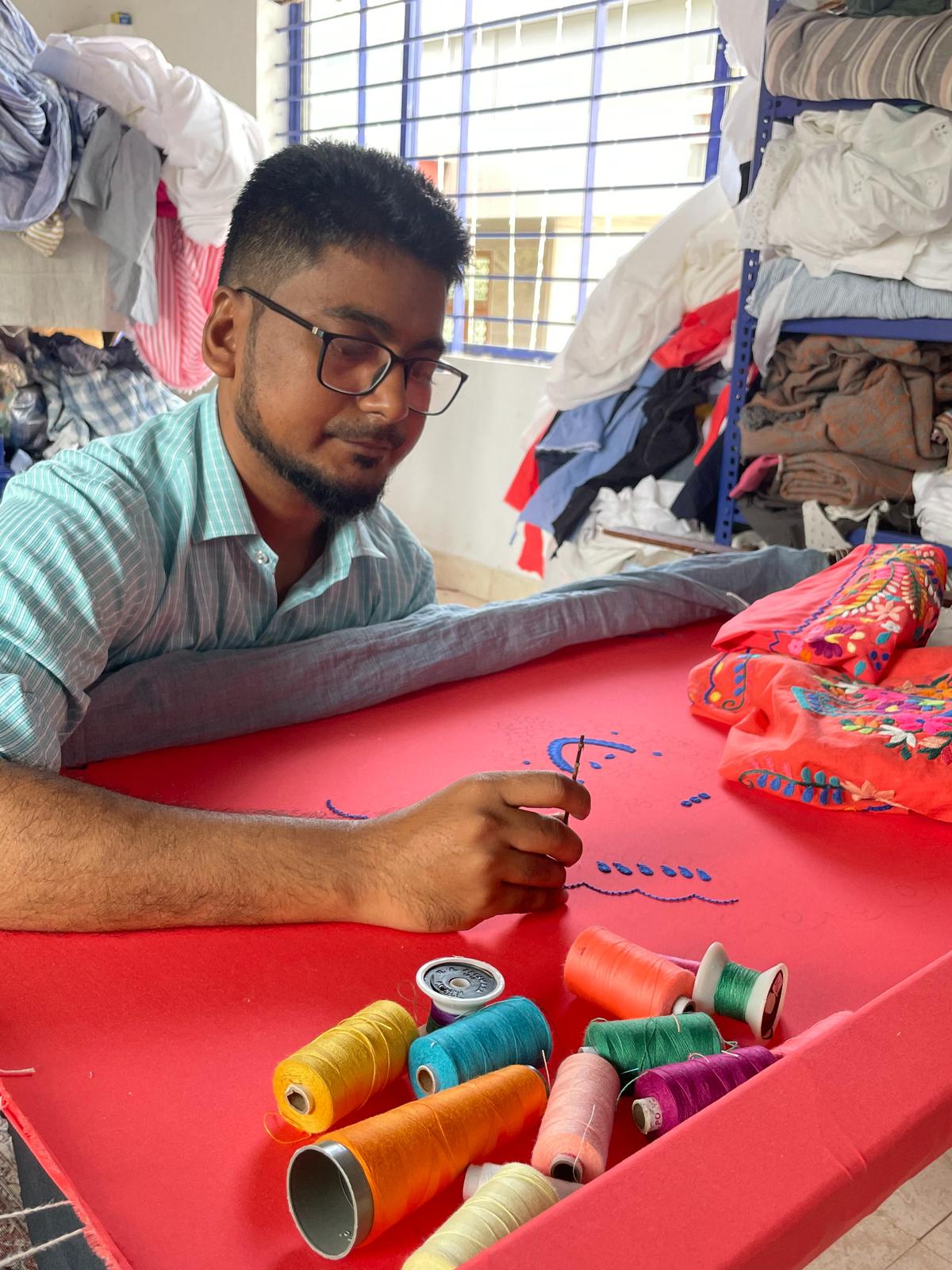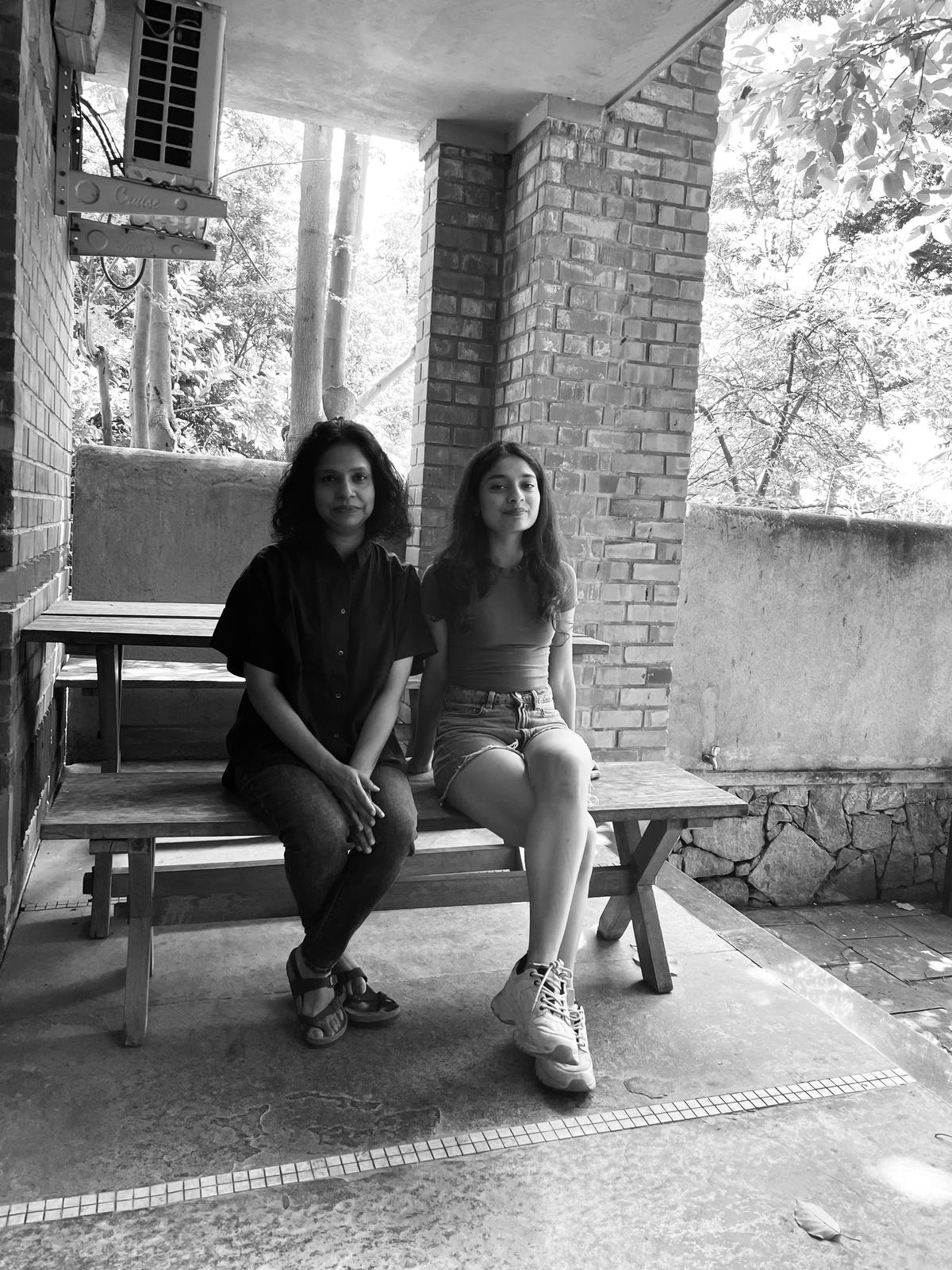S24 Parganas in Bengaluru employs embroidery artisans from Bengal
Bengaluru-based S24 Parganas employs aari and zardozi hand embroiderers from the West Bengal district of the same name to craft statement tops, dresses and jackets
Bengaluru-based S24 Parganas employs aari and zardozi embroiderers from the West Bengal district of the same name to craft statement tops, dresses and jackets
During the first Covid-induced lockdown in 2020, Bengaluru-based entrepreneur Sosha Thomas received a call from an embroidery artisan in need of help. “He used to work with me earlier, and had lost his job due to the pandemic. He was expecting his first child and did not want to go to his village in West Bengal emptyhanded. As per COVID-19 norms, we got permission from the officials for him to work at my studio,” says Sosha, who has been exporting hand embroidery designs to fashion studios in the UK and the US — such as Hale Bob, Amanda Kelly — for the past decade. But when several other artisans from Bengal approached her for work, things took a different turn, and soon her apparel brand S24 Parganas — named after the district the artisans hailed from — was born.
“I had never considered starting a domestic brand as I was very content with what I was doing, but we had to create work for them,” says Sosha, who kickstarted the brand in 2020 with a small line of handembroidered tops and silk kurtas, accompanied by two karigars. “We wondered if it would be possible for these brilliant karigars to get work in their own villages, rather than be migrant labour. This worked well as they were happy to work with their families around them. The reaction to our initial collection was phenomenal,” says the 49-year-old entrepreneur, adding that the artisans returned home once lockdown restrictions eased but continued working from there. All the artworks are original, and hand drawn by Sosha and her daughters, that are couriered with the raw materials to the artisans in South 24 Parganas. Once they receive the embroidered panels, the team at Bengaluru, wash, dry-clean and sew them on garments.

An artisan at work
In addition to Covid, Sosha explains how the homes of the karigars were severely damaged by cyclone Amphan. “Also, with digital embroidery flooding all segments of the market, hand embroidery was losing its value. At this point the embroiderers were disillusioned and looking for other occupations.”
Mayflowers and geometry
The brand’s latest collection, launched in February 2022, draws inspiration from traditional Eastern European embroidery and comprises dresses and tops. “It has a vibrant colour palette — fuschia, deep purple, mulberry, jade — and showcases three-dimensional embroidery with floral, geometric, and Aztec-inspired motifs on fine muslin cotton in contrast with our silk kantha-patchwork jackets,” says Sosha, explaining how when she noticed the kantha quilts handmade by the karigars’ mothers from old sarees, their line of jackets took shape. With bright floral motifs taking centre stage in most outfits, she says their most popular blouse, The Mayflowers, is from their first collection. “It combines intricate geometric borders and Hungarian floral motifs.” The fuchsia dress, with Natureinspired floral embroidery is another favourite, as is their Cypress blouse with miniature Mughal florals in embroidery.

Sosha Thomas (left) with her daughter Samara
All eyes on aari
When compared to other embroidery styles, what makes South 24 Parganas’ art form unique? Sosha says the embroiderers from the district are descendants of the original zardozi and aarikarigars. “Their skill and colour-sense is unmatched. We use contemporary designs fused with traditional hand embroidery techniques to create products. While many women embroiderers use the round, wooden frame, these karigars work on long wooden frames, with special aari needles,” she says, adding that the front and back of the embroidery are identical, unlike in machine or computer embroidery where the reverse side is noticeable.
Nearly 20 artisans employed by Sosha work only with natural fabrics such as cotton, linen and silk. “We also use fabric made with recycled yarn. Our kantha jackets are a patchwork of repurposed fabric,” she says, adding, “The women had never been paid for their work before, so this was a huge step forward for us.”
A snapshot from their collection
Sustainable heirloom
From the initial line of embroidered white blouses, crafted in 2020, to having two collections a year, the entrepreneur says the brand has come a long way. “We want hand embroidery to be accessible to more people as this would result in more work for embroiderers. While most hand embroidery brands use viscose silk thread, we use cotton thread, which is machine washable and long-lasting,” adds Sosha, who is working on a modern line of silk kurtas for India. “To meet the demand, we are bringing back the kurtas — with gara embroidery — that were a part of our first launch.” At present, the team is experimenting with phulkari, suzani embroidery that will soon be seen in their Winter 2022 collection comprising jackets and tunics in darker shades.
Detailing their small steps towards sustainability, Sosha says she is looking at including more handloom and recycled yarn fabric into their collections. “We are also working on ways to minimise fabric wastage by reusing scraps generated by cutting into patchworks, jackets, and even our packaging bags,” she adds, stating that the brand would, without being overly expensive, like its garments to be heirloom pieces.
A patchwork jacket from their collection
In the next three years, the team hopes to scale up and work with different marginalised communities in Bengaluru and South 24 Parganas. “We have started employing women from disadvantaged sections who are being taught embroidery at a local school in Bengaluru. We are trying to train them to craft our jackets,” says Sosha, adding that she is working on collaborating with stores like Ambara in Bengaluru, and a few in Paris. “We want to grow the brand organically, making the karigar the centre of our story. Abroad, designers visit the artisan’s home, but in India, they come to us looking for work and remain nameless. I want to change that,” she concludes.
₹ 2,900- ₹ 4,900. To order, WhatsApp 9731527819
For all the latest Life Style News Click Here
For the latest news and updates, follow us on Google News.
